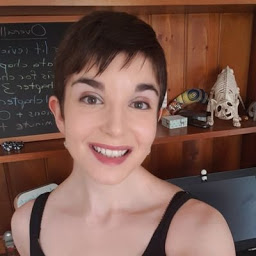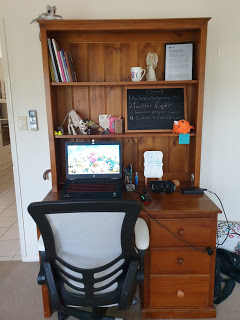I am Brooke Deak, and This is How I Work
Today, I have the pleasure of interviewing Brooke Deak for the “How I Work” series. Brooke Deak is a Ph.D Candidate at the University of Adelaide. Her research looks at how social perceptions and attitudes around feral cats influence different feral cat management approaches around the world. She is due to complete her thesis in about a month, and looks forward to continuing to explore the social aspects of environmental management.
Can you briefly explain your current situation and research to us?
I’m currently a PhD Candidate, and I have about 2 months left until I submit my thesis. It will be almost exactly 3 years that I’ve been working on my research once I submit, and I’m looking forward to the final product! My research looks at the social factors that influence how people perceive feral cats as well as feral cat management methods, and how these perceptions influence the planning and implementation of management. I’ve published one paper so far that looks at global perceptions of feral cats and how they are defined in different countries, and I’m working on 3 others. One looks at how gender and previous knowledge about feral cats and management methods influences reactions to management methods that are being proposed in areas of south-eastern Australia; another looks at how land use influences the likelihood for landholders to allow the use of various methods on their properties, also in south-eastern Australia; and the final one looks at the social media (Twitter) narrative around feral cats between different countries and invested groups within those countries.
What tools, apps and software are essential to your workflow?
Qualtrics was the survey platform that I used to create my online questionnaire to gather my data, and it was an excellent tool. It was user friendly and allowed me many options for designing the questionnaire the way I wanted, and there was even an opportunity to create a heat map where participants could mark the approximate locations of their properties within our study areas, and we could assess how many people were speaking for each location.
For data analysis, I used the program R which was a challenge in the beginning because I had never used it before, but once I got the hang of it, it was a life-saver and opened up a world of possibilities for quantitative analysis.
I also frequently use the Microsoft Office suite, including Excel, Word, Access, and Powerpoint for different portions of the project. Apart from the project itself, my normal ritual of keeping track of tasks includes having a blackboard with a list of overall tasks to be completed, followed by a small whiteboard where I update my essential tasks every day.
What does your workspace setup look like?
We moved recently to a different state, and so I’m finishing my PhD remotely. I have a home office where I work 90% of the time, but occasionally I’ll switch it up and work in the dining room or lounge. Normally I would sometimes go to the public library to work, or to a cafe so that I could be around people in a semi-bustling environment, but because of COVID-19, I’ve had to settle with just the home office or other workspaces around the house.
What is your best advice for productive academic work?
Time management is key! I like to stay ahead in my tasks so that in the event that something should go wrong, I have time to fix the problem or adjust that portion of the project as need be. Also, I’ve found that I work best when I am relaxed. Even if I’m stressed with deadlines, I’ll take a moment to breathe, put on some motivational music for a few minutes and get myself into the right headspace so that I can focus on what needs to be done and not worry about things that are outside of my control.
How do you keep an overview of projects and tasks?
I write down all of my larger, overall tasks on a blackboard, and then I break those tasks down into smaller components that need to be completed either by week or month. I have a list of daily tasks that I need to accomplish, and I go through those and update the list each day. As my work is mainly research that needs to be done within a certain time limit, I will usually give myself about a month to complete the analysis per project (sometimes longer, but a month initially), and then a week to write up each paper. After that, it’s usually a day or so for each edited version until the paper is completed and ready to be submitted to a journal.
Besides phone and computer, do you use other technological tools in work and daily life?
Honestly, I relax by either playing videogames on my Nintendo Switch, or watching Critical Role on YouTube, if those count!
Otherwise, I try to stray away from screens and go outside to work in the garden, or workout in my home gym.
Which skill makes you stand out as an academic?
I would say my ability to accomplish tasks fairly quickly, and to produce written articles at a fast pace. I’d also say that my research is of interest to a lot of people outside of academia, and I enjoy working to connect the general public and others to the works of academia in a way that is easily accessible for them. Knowledge is for everyone, and I believe that making information accessible, not just for people outside of your field, but for people outside of academia in general, is incredibly important. I strive to do just that.
What do you listen to when you work?
It really depends on the day and what I’m working on. If I’m creating figures or running analysis, I’ll listen to fast-paced, fun music on Spotify. If I’m writing, I will either listen to soothing classical music, or nothing because I need to concentrate. I can’t write when I’m bopping!
What are you currently reading? How do you find time for reading?
I just finished Treasure Island for the first time, and I’m now reading the Overstory by Richard Powers. It’s an incredibly powerful novel, and it takes you on a journey through the lives of different individuals and their relationship with different trees. It sounds weird or boring, and honestly I thought it might be, but the first chapter alone hit me in the emotions like a brick! It’s very enjoyable so far. I read every night before bed. The night isn’t complete unless I’ve read a chapter or two. Otherwise, I just constantly think about my work and what comes next, and my brain never quite takes a break! Reading is the relaxation technique I use to exit out of the work world for a while.
Are you more of an introvert or extrovert?
I am definitely an introvert. I like people, but I don’t need to be around them all of the time. I’m quite autonomous, and I enjoy working in my own space and getting things accomplished at my own pace. Then again, if I am working in a group, I tend to lead group discussions and get everyone’s input, and then divide tasks equally among the group members so that everyone has an equal part to play.
What’s your sleep routine like?
I try to be in bed reading by 9pm and then am usually up by 6am or 6:30am. I’m working from home, so it helps to have a partner who has regular work hours so that I can keep a routine based on his routine.
What’s your work routine like?
I get up at my normal time, go for a walk around the neighbourhood, feed the dogs, make some coffee, and then get straight into my work either by 8am or 9am. I create my task list for the day, check my emails, and then get started on the first task. I work until lunch, which sometimes is only 15 minutes depending on what task I’m working on, and then I get back to it until about 4pm or 5pm. If I’m working on writing or substantial edits, sometimes I will work into the night until whatever needs to be fixed is fixed. It might seem like a lot to some people, but that’s usually how I get my work done so quickly.
What’s the best advice you ever received?
“Manage your supervisors.” I have four supervisors, all with very different, brilliant opinions, and when I first started my PhD I was overwhelmed by what everyone wanted out of the project.
My first paper, my literature review, was absolute garbage because I was trying to incorporate so many ideas and towards the end of the first 6 months, my project was ginormous! I had tried to do everything that everyone had wanted, but then a postdoc told me that I needed “manage my supervisors” if I wanted to get my PhD done on time, otherwise I would be there forever, and I found that to be the most helpful advice. I was then able to backtrack and figure out what it was that I actually wanted out of the project, and later on figure out the capacity in which I could accomplish my goals within three years. Of course, my wonderful supervisors still get something out of the project, but now it’s not going to take me 10 years to complete my degree.


